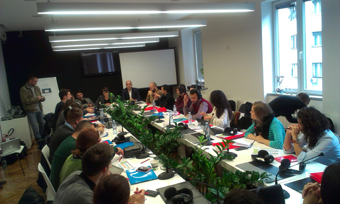Third Regional School of Transitional Justice: By Learning Towards Remembrance
 The third Regional School of Transitional Justice was launched today in the library of the Humanitarian Law Center (HLC). The ten-day education programme on mechanisms of dealing with the past is being attended by 25 students, young professionals, scholars, and human rights activists from Bosnia and Herzegovina, Kosovo and Serbia. The School is organized by the HLC, the Pravnik (Lawyer) Association from Sarajevo, and the Humanitarian Law Center Kosovo.
The third Regional School of Transitional Justice was launched today in the library of the Humanitarian Law Center (HLC). The ten-day education programme on mechanisms of dealing with the past is being attended by 25 students, young professionals, scholars, and human rights activists from Bosnia and Herzegovina, Kosovo and Serbia. The School is organized by the HLC, the Pravnik (Lawyer) Association from Sarajevo, and the Humanitarian Law Center Kosovo.
From the very beginning, war crimes trials have served as a symbolic message to victims that justice for crimes committed is possible, Sandra Orlović, Executive Director of the HLC, stated to the students. At the same time, education about the past and learning about the judicial facts are important, because they create resistance to myths, which have served as an incitement to wars and war crimes; but also because they help the younger generation to comprehend more easily the present of the societies they are living in. Besides this, by learning about the past we show respect towards and acknowledge the victims, and we become the bearers of the memory of the suffering of the victims, who are obliged to share that memory within their communities.
Almin Škrijelj, the Director of the Pravnik Association from Sarajevo, emphasized that what is important to learn about the past is that it has an impact on the present and the societies we live in today. Knowledge about the past, which we were deprived of at the beginning of the last war, also helps us to realize the weaknesses and tensions within societies, which can always jeopardize peace.
Fatos Bytyqi, the brother of Agron, Ylli and Mehmet Bytyqi, who were executed by members of the Republic of Serbia Ministry of the Interior in July 1999 in the police facility in Petrovo Selo, also addressed the students. Fatos has already spent 15 years demanding that the institutions of the Republic of Serbia find and prosecute the persons who ordered and committed this war crime. He stated that the representatives of institutions always hear him out, and then they either act surprised at the absence of justice or they justify the perpetrator; but they never take concrete steps towards the resolution of this case. Fatos still believes that justice will soon be served, and pointed out that it is important for him that this justice is in accordance with the law of the state which is responsible for this crime.







